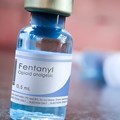Better monitoring of the purchase of codeine can help to stem a growing substance-abuse problem.
Fueled by popular music, the promise of escapism and the fact that it’s relatively cheap, some of South Africa’s youth have become increasingly addicted to codeine-based over-the-counter products which can be purchased without a doctor’s prescription at a local pharmacy. Products such as cough mixtures and pain medications can innocently lead to abuse as they contain codeine known for its sedative properties.
“Lean”, as it is typically called among its users, along with other popular names, is usually taken as a mixture of a soft drink and prescription-strength doses of cough syrup that contains codeine and often promethazine. This mixture, when used recreationally and in large amounts, can cause feelings of euphoria and may lead to dependence and substance abuse disorders.
“We have seen a similar outbreak in abuse in our neighbours to the north of the continent, but with the primary substance of abuse being Tramadol in North, West and Central Africa,” says David Bayever, chairperson of the International Society of Substance Use Professionals (ISSUP). “What we need to understand is that substance abuse is less about the actual substance, and more about the behaviour of the people involved.
“The other issue is the environments of poverty, crime and stress that are so prevalent in South Africa and can drive more people to become chemically dependent on substances in the first place,” he adds.
According to the United Nations Office on Drugs and Crime, opioids are the second most popular recreational drug after cannabis in Africa, with codeine being one of the most common and easily accessible opioids. The report indicates that the continent is responsible for over half of the global amounts of pharmaceutical opioids confiscated between 2016 and 2020, showing the rapid spread of the epidemic in Africa.
Codeine is a natural alkaloid of the opium poppy plant. However, most of the codeine currently manufactured is obtained from morphine through a semi-synthetic process.
Codeine, when taken in large amounts, can lead to a slow heart rate, respiratory depression, and sometimes even death due to its strong sedative effect. It is often combined with other medicines in small, safe doses to manage moderate pain. When used in this way for only a few days, there is little to no risk of addiction. The danger of addiction only arises when codeine is taken over a long period of time (weeks or months).
Navigating legal opioids
“The difficulty with these opioid medications is that they are legal, which can reduce much of the stigma associated with illegal street drugs,” Bayever says. “Codeine might be mixed with alcohol and other substances, which can be extremely life-threatening. However, even more concerning is when people inadvertently become dependent due to a lack of information.
“During the Covid-19 pandemic, we saw a much higher incidence of mental-health illnesses, and people who realised the soothing effects of these medicines would have come to rely on them rather than trying to find other coping methods. This is especially detrimental to young people because their brains are still developing.
“Although codeine and similar schedule 2 (S2) medicines pale in comparison with harder street drugs, in terms of volumes, they can be acquired much more easily and without having to enter dangerous environments. Even when pharmacies ask for a name and address, for tracking purposes, users often give false information,” he adds.
South African pharmacists have no knowledge of a patient’s previous purchasing patterns of these products albeit that they are required by law to control the sales and monitor patients' use. Furthermore, while S2 sales are required to be recorded, along with the customer’s name, address and ID there is no central database in which this information is stored and made available to pharmacists which makes misuse and abuse relatively easy.
Empowering pharmacists
The Codeine Care Initiative was initially launched in 2013. However, due mainly to a perceived lack of enforceability across all pharmacy outlets, it has yet to receive a large body of support and has had limited traction. Since the introduction of pharmacists having to legally record the consumer's ID, support has gained traction.
The Codeine Care Initiative seeks to empower pharmacists to record and monitor purchasing behaviour and to make informed decisions regarding dispensing and selling over-the-counter products containing codeine to patients utilising a national database that links all sales and dispensing of codeine-containing products.
The initiative is currently being developed by the Independent Community Pharmacy Association (ICPA) for relaunch. The purpose of this initiative is not to punish but to raise awareness about the gradual development of physical dependence and addiction.
In some cases, individuals may not realise that they are at risk of becoming physically dependent or addicted to codeine. This lack of awareness can lead to misuse and abuse, ultimately resulting in addiction.
The initiative will provide essential information at the pharmacy level, enabling pharmacists to fulfil their ethical duties effectively. For individuals who abuse or misuse medication, whether intentionally or unintentionally, this will serve as an early intervention measure allowing a referral to an appropriate resource for help, thus reducing associated harm.
Smart monitoring and responsible intervention
If patients are found frequently visiting different pharmacies during a period of a month or buying excessive amounts of codeine-containing products, the Codeine Care Initiative system will identify those patients, as it suggests that they may be developing dependence, which can lead to a substance-use disorder.
The system will then inform pharmacists of the issue. Additionally, pharmacists can monitor if the patient frequently visits different pharmacies to purchase more codeine than is recommended. In such cases, the pharmacist can use their judgment to decide whether or not to ‘red flag’ the patient.
Pharmacists will be able to override the system in cases where a patient requires more than the normal dosage of codeine to treat specific conditions, such as neuropathic or nociceptive pain, under the guidance of a healthcare professional. However, all such overrides are recorded.
It should be noted that the programme will be implemented within the confines of all the necessary regulations to ensure the protection of personal information.
“As a manufacturer of affordable, quality medicines and with an ethos of “caring for life”, ensuring that these products are used in a safe, responsible manner is absolutely critical,” says Cipla South Africa chief executive officer, Paul Miller.
“We therefore support the initiative to have stricter control around codeine-containing products to tackle the problem of addiction associated with non-therapeutic usage."

















































